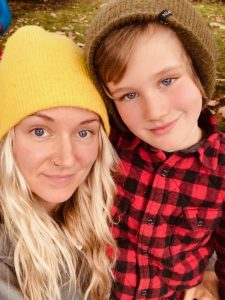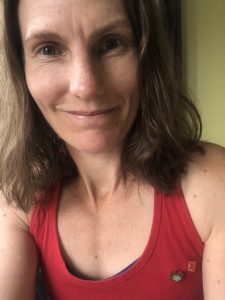Experiencing mental breakdown, becoming a stay-at home mom overnight and juggling expectations in times of a pandemic. These are some of the experiences of women in Revelstoke who showed incredible resilience over the course of this past year. March 8 is International Women’s Day and this year we’re celebrating the ways in which the women among us have overcome adversity and daily challenges. 
International Women’s Day has celebrated women and their resilience since 1911. Resilience is one’s ability to bounce back from hardship and has become a buzzword since COVID-19. Though the following stories and challenges are different, the common factor is the breakthroughs these women experienced and their ability to reflect and grow through their support networks and daily self-care.
Who will stay at home?
The COVID-19 pandemic has impacted most of us in some way and we have learned tools to deal with it. As the economy shut down early in the pandemic and childcare and schools were closed, many working families were faced with the decision as to which parent would continue working and who would stay at home.

Katie, with one of her sons. She made a difficult choice for the well-being of her family.
For photographer Katie Langmuir, she gave up her own career for the well-being of her family, stepping away from her work to be at home with the kids fully time. “My income was gone and learning to modify life to fit that reality weighed heavy on me, all the while trying to make a million snacks,” she said.
While she was overwhelmed with multiple things to do, she adapted and learned to let go and be ok with things not getting done. “But do what you can and leave the rest,” she said. “It will be there when you have the time, and the stress and pressure put on myself was never worth it.”
The pandemic and time out from her career forced Katie to acknowledge that the hamster wheel of life she previously had been running was leading her to a burn out.
“For the first time in almost a decade, and after a lot of coming to terms with my new reality, I was able to look at my life with a sense of clarity,” she said. “This clarity I’ve recognized is an extreme privilege I have and has certainly not been available to everyone during these times.”
She took stock of her life without the previous distractions and it revealed to her what mattered. She’s hoping to create a more sustainable path moving forward in her career. While she feels she will always have to juggle multiple hats, it’s brought her insight to the bigger picture.
“I have found a sense of peace within myself I didn’t know existed,” she said.
What got her through her difficult times was creating rituals with the important women in her life, even though they were scattered from one side of the country to the other. This regular connection has become vital in her life.
“Often times we don’t even need to verbally communicate, but just knowing that the person is there and present brings me a deep sense of connection that breeds hope and joy,” Katie said.
Similarly, the Revelstoke women’s shelter offers the Moving Forward program to women in the community who may not have access to a support network, so that they can also benefit from this type of contact. The group provides peer support and offers a number of therapeutic activities such as yoga, art and meditation, open to any woman wanting to join.
Stress and the breakdown of mental health

Naomi experienced a nervous breakdown. She says a daily gratitude and meditation practice have had a great impact on her recovery.
Physiotherapist Naomi, 39, was still adjusting to her new life as a single mother of two boys when the pandemic saw her lose the supports that allowed her to juggle working full time and being a mother. Learning to migrate her physiotherapy clinic to an online platform required an enormous amount of work. Not only did she have to learn a brand new way of delivering services, she had to do it while having her children at home.
“I had to work twice as hard and I didn’t have the support I normally had with full-time daycare and school,” she said. “I also lost the capacity to have friendship support.”
Due to the way emergency funds were distributed, Naomi received no financial support from the government so she had to keep working to pay her mortgage and support her family, despite her available time being severely impacted.
“Just making it through a week without feeling so exhausted,” she said. “It became very stressful to have my kids and trying to maintain my business as well as a sense of well-being.”
Eventually the stress became too much and Naomi experienced a major breakdown, leaving her unable to handle any kind of stimulus. For three weeks she couldn’t look after her kids as she dealt with being unable to able to walk or drive or deal with temperature, light, and emotion.
“I was in my bed or under a tree for many days and it was very difficult not to be able to see or look after my children,” she said. “At the same time, I knew I had to ask for help. And that I couldn’t get better on my own.”
Her recovery has been a process of slowly increasing her threshold to various stressors. She relied on her support network of friends to get through it, asking for help with meals and visits. Despite this difficult experience, she found growth and learning.
“At some point you just have to get better at accepting that life is as it is and you just have to do your best to enjoy it,” she said. “You learn that these things come and go, so I’ve been focusing on how do I enjoy the extra time with my kids or how do I find room for myself in the everyday that I couldn’t find before.”
From this she found the key to resilience as mindfulness, gratitude and empathy; she reintroduced a meditation practice into her life and sought out therapy.
“I now have a daily gratitude practice,” she said. “It was hard to find three things to be grateful for when I couldn’t work, couldn’t see my kids and was lying under a tree, but I knew that was the pathway out.”
“We can’t escape the struggles we are going to go through, but how we meet them and the attitude we take to the ups and downs that life brings makes a big difference.”
“I am determined to be a well-regulated, mindful person especially to be a better parent to my kids.”
Juggling expectations during a pandemic

The pandemic placed restrictions on Hailey soon after she had left an abusive relationship and was beginning to feel freedom again.
Hailey is part of the Revelstoke Women’s Shelter Society, coming on as a board member after experiencing an abusive relationship. Inspired to help other women in a similar situation, she wanted to help grow awareness of the shelter’s services and now manages the shelter’s Instagram account.
She experienced a number of challenges during the pandemic. As a part-time teacher, she was required to adapt to the slew of new protocols, parent expectations, and social distancing practices while finding a way to deliver a fun learning environment for her students, which all required additional planning.
Outside the strain of work, she was navigating a new relationship in the weird time of the pandemic and dealing with living in a shared home. Simply running an errand became a challenge due to her fear of getting sick and unknowingly passing it onto one of her students. Also, if a roommate got sick she would have to take time off work.
“I felt a lot of anxiety in really thinking about how my actions could affect those around me,” she said. I felt shame and guilt when I couldn’t be at work or contribute as I normally would, and a preset of shame that I might have made someone else sick.”
When the pandemic began, she was healing from her previous emotionally abusive relationship.
“As I was just starting to explore this new freedom and opportunity, my life became limited all over again in a whole new way,” she said.
She found self-care practices made a big difference to her. This included therapy, reading, spending time in nature, journaling, phone calls with friends and having a healthy relationship with a supportive partner.
“I am lucky to have that, they have helped me adjust to the change,” she said. “There have been constant adjustments. It’s easy to not realize how much mental stress you are under until you see how it starts to play out in other elements of your life.”
She has also found it rewarding to participate in the women’s shelter activities. The shelter provides tips and tools for managing stress, learning about healthy relationships, and free one-on-one professional counselling.
Loss in the time of COVID-19
At the beginning of the pandemic, Jamie Cruickshank, like many in Revelstoke, was trying to make ends meet by juggling multiple part-time, service and tourist based jobs. She also was trying to eke out time to have fun and progress her outdoor skills.

Jamie experienced loss and juggling multiple part-time jobs at the onset, and during the pandemic. She says her friends support was vital in helping her get through it.
Earlier in the year, she had been dealing with the loss of an uncle to suicide. She was able to see family at the time and attend the funeral, but when a close friend died in a white water kayak accident later in 2020, attending a larger event wasn’t possible. Fortunately, she was able to celebrate his life with a small group of friends in Revelstoke.
“Thankfully keeping busy with work and having this beautiful community of friends here has helped me cope,” Jamie said.
Since her uncle’s death she says mental health has been on her radar and she made time to check in with friends and herself. Her self-care included attending classes at Alchemy Studio.
“I’ve seen already friends struggling without even knowing because COVID has restricted our social life and financial life,” she said.
While she has faced many challenges, she felt working hard and looking after herself makes her a better person for everyone around her.
“Everyone is struggling and just getting by so it helps knowing we are all struggling together this time around and we will get through it,” she said.
Strength in support
It’s important not to suffer alone. Naomi noted that, “I think asking for help is very hard to do.” Friends and family can be part of our safety net but every person has their own mental health recipe, which can include taking time for you, gratitude practices, giving to others in the community, or seeing a counsellor. This helps build our ability to navigate life’s challenges — especially as COVID-19 persists.
If you are in need of support, the Revelstoke women’s shelter’s Moving Forward program offers a supportive environment to connect with others through art, yoga, meditation, women’s circles, counselling and more. If you are interested in accessing the program, please get in touch. We are all resilient and the shelter is there to help you tap into your strength.